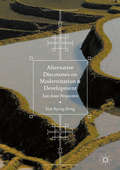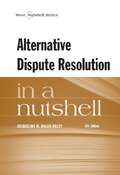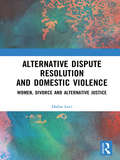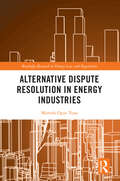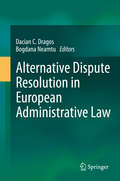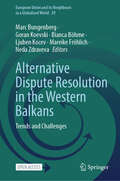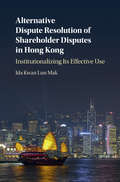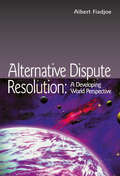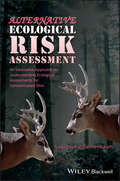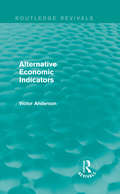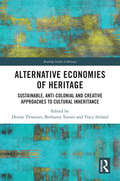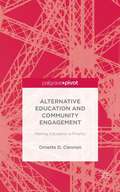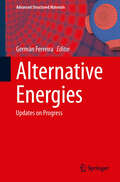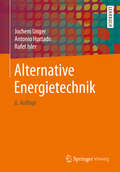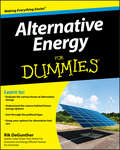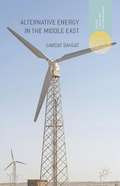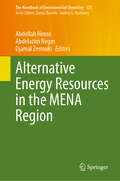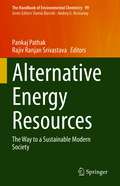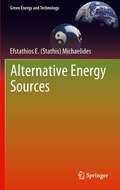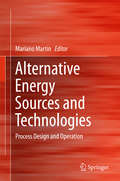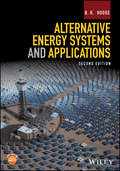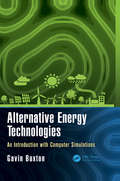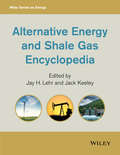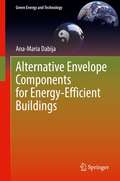- Table View
- List View
Alternative Discourses And The Academy
by Helen Fox Christopher Schroeder Patricia BizzellPatricia Bizzell has argued that teachers of composition, if they are going to prepare students for success in other classrooms and other contexts, cannot afford to ignore alternative forms of discourse that are appearing now in the academy. This edited collection of original essays both discusses and at times exemplifies extraordinary examples of just such alternatives-discourses that embody new and different forms of intellectual work Together, their writings pose and answer some intriguing questions about the: use of nonstandard discourse to illustrate unconventional forms of intellectual work role of nonstandard discourse in scholarship from disciplines across the curriculum theoretical complexities of discourses defined as "alternative," "hybrid," "mixed," or "constructed" relationships among communities, discourses, and linguistic standards new conditions in composition classrooms made up of more students of English as a foreign language and students using non-standard dialects teacher-student relationships within the context of alternative forms of intellectual work. Using unconventional structures and formats while acknowledging new modes and methods, this provocative volume argues eloquently for inclusion of a broader range of expression in academic writing.
Alternative Discourses on Modernization and Development: East Asian Perspectives
by Kim Kyong-DongThis cutting edge work offers an alternative perspective on existing paradigms of modernization and development that originated in the West from the vantage point of non-western, late-modernizing societies. It considers how East Asian philosophical ideas enrich the reformulation of the concept of development or societal development, and how influential principles of traditional culture such as yin-yang dialectic interact with modern ideas and technology. It addresses the significance of alternative discourses as culturally independent scholarship, and the problems of pervasive mechanisms of social, political, economic, and cultural dependence in the global academic world.
Alternative Dispute Resolution In A Nutshell (Nutshells Ser.)
by Jacqueline Nolan-HaleyAlternative Dispute Resolution in a Nutshell (Nutshells) 4th Edition
Alternative Dispute Resolution and Domestic Violence: Women, Divorce and Alternative Justice
by Dafna LaviDealing with the interface between the Alternative Dispute Resolution (ADR) movement and the phenomenon of domestic violence against women, this book examines the phenomenon of divorce disputes involving violence through the prism of ‘alternative justice’ and the dispute resolution mechanisms offered by the ADR movement. This book is the first academic treatise presenting the theoretical underpinnings of the correlation between the ADR movement and divorce disputes involving violence, and the potential contribution of this movement to the treatment of disputes of this nature. Through mapping the main values of the ADR movement, the book proposes a theoretical-analytical basis for understanding the inability of the legal system to deal with disputes of this nature, alongside a real alternative, in the form of the ADR mechanisms.
Alternative Dispute Resolution in Energy Industries (Routledge Research in Energy Law and Regulation)
by Mustafa Oğuz TunaThe disputes that arise between host states and investors in the energy sector put a high number of valuable and vital projects in the countries at risk. Investment treaty arbitration mechanisms, as the traditional remedy, have provided a solution to these problems for decades. However, as the number of disputes increases, the sufficiency of arbitration in responding to disputes became questionable in addition to the long-lasting and costly cases. Accordingly, ADR mechanisms outside the arbitration cannon have triggered growing interest among practitioners. Despite the attraction and the apparent benefits of ADR such as being cheaper, faster and with better outcomes compared to arbitration, there are also hurdles in front that hinder the application of ADR. This has lead to the underuse of ADR in appropriate contexts. This study has been conducted to research the gap for the applicability of the ADR methods for investment disputes in the energy sector with the doctrinal analysis of the existing literature either promoting or opposing ADR. Its findings provide guidance for alternative dispute resolution practitioners on when to use ADR, how to use ADR and on what disputes ADR to be used to resolve conflicts in International Energy Investment.
Alternative Dispute Resolution in European Administrative Law
by Dacian C. Dragos Bogdana NeamtuThis book examines the role, the general framework and the empirical effectiveness of the main alternative dispute resolution tools (administrative appeals, mediation, and ombudsman) in administrative matters, within the broader context of the administrative justice system. The book uses approaches from the fields of law, public administration, public policy and political science to assess the importance of different instruments for alternative dispute resolution, with an emphasis on administrative appeals.
Alternative Dispute Resolution in the Western Balkans: Trends and Challenges (European Union and its Neighbours in a Globalized World #20)
by Marc Bungenberg Mareike Fröhlich Goran Koevski Bianca Böhme Ljuben Kocev Neda ZdravevaAlternative Dispute Resolution (ADR) is increasingly recognized as an attractive alternative to national court proceedings, especially in international business relations. This open access book focuses on ADR mechanisms in one specific geographical region: the Western Balkans. This region comprises Albania, Bosnia and Herzegovina, Croatia, North Macedonia, Montenegro, Kosovo, and Serbia. Although these countries generally have legal frameworks for ADR mechanisms in place, they remain largely underutilised in practice. Promoting ADR mechanisms in the countries of the Western Balkans could make them more attractive to foreign investors, thereby fostering economic growth. Additionally, the effective implementation of ADR mechanisms could have spill-over effects on national judiciaries, thereby increasing domestic rule of law standards. This would be highly beneficial for the Western Balkan countries, most of which are still aspiring to become Member States of the European Union (EU). To achieve this, they are required to promote the use of ADR mechanisms and align their legal frameworks with EU standards. Against this background, this book aims to explore the trends and challenges of ADR in the Western Balkans. The different chapters primarily focus on international commercial arbitration, investment treaty arbitration, and mediation. Some chapters address systemic challenges, such as capacity building and dispute prevention, which extend to the entire region. Others offer country-specific analyses of particular national framework. While some chapters adopt the perspective of international or EU law, others remain at the national level. Collectively, the wide diversity in topics and perspectives provides a comprehensive overview of the trends and challenges of ADR mechanisms in the Western Balkan.
Alternative Dispute Resolution of Shareholder Disputes in Hong Kong: Institutionalizing Its Effective Use
by Mak Ida Kwan LunThe landscape of shareholder dispute resolution in Hong Kong has changed vastly since the launch of the Civil Justice Reform in 2009. Key initiatives - the voluntary court-connected scheme and reform of the statutory unfair prejudice provisions - were employed to promote the greater use of alternative dispute resolution (ADR) in shareholder disputes. While the Hong Kong government and judiciary introduced such schemes to prove the legitimacy of extra-judicial over court-based litigation processes, their success is still uncertain. In this book, socio-legal theory and sociological institutionalism are used to develop a theoretical framework for analyzing the key stages of institutionalization. The author analyzes how procedural innovations could acquire legitimacy through different types of legal and non-legal inducement mechanisms within the institutionalization process. Recommendations on codifying and innovating ADR policy in Hong Kong shareholder disputes made with comparison to similar policies in the United Kingdom, South Africa and New Zealand.
Alternative Dispute Resolution: A Developing World Perspective (Commonwealth Caribbean Law)
by Albert FiadjoeThis book highlights the tremendous shift in the traditional arrangements for the delivery of civil justice in the Commonwealth Caribbean, from litigation to alternative dispute resolution (ADR) processes. Over the last quarter of a century, much learning has taken place on the topic of ADR and the literature on the subject is now voluminous. This book puts forward the thesis that the peculiar experiences of the developing world ought to help reshape our traditional notions of ADR. Furthermore, the impact of globalisation on the developing world has brought with it special and peculiar challenges to our notions of civil and criminal justice which are not replicated elsewhere. This book will appeal to a wide readership. The legal profession, students of law and politics, social scientists, mediators, the police, state officers and the public at large will find its contents of interest.
Alternative Ecological Risk Assessment: An Innovative Approach to Understanding Ecological Assessments for Contaminated Sites
by Lawrence V. TannenbaumIn Alternative Ecological Risk Assessment the author, Lawrence V. Tannenbaum, provides a critical review of current practices in the ecological risk assessment field and proposes alternatives that are supported by established science and keen observation. It is hoped that this approach will pave the way to a greater understanding of what appropriate and useful ecological assessment for contaminated sites should entail. He demonstrates that in most cases current practices do not provide for an assessment of ecological risk, and moreover, that endeavoring to assess ecological risk is actually an unnecessary undertaking at conventional hazardous waste sites. (He states, for example, that the concept of scale is often ignored by practitioners, questions why animals like deer are routinely assessed at 5-acre sites, and challenges the ecotoxicology data currently used.) The book is aimed at students and professionals in the fields of environmental science, ecology, ecotoxicology, and health risk assessment.
Alternative Economic Indicators (Routledge Revivals)
by Victor AndersonThe main objective of politicians is to maximise economic growth, which heavily drives political policy and decision-making. Critics of the maximisation of growth as the central aim of economic policy have argued that growth in itself is not necessarily a good thing, particularly for the environment; however, what would replace the system and how it would be measured are questions that have been rarely answered satisfactorily. First published in 1991, this book was the first to lay out an entirely new set of practical proposals for developing new economic measurement tools, with the aim of being sustainable, ‘green’ and human-centred. Victor Anderson proposes that a whole set of indicators, rather than a single one, should play all the roles that GNP (Gross National Product) is responsible for. With a detailed overview of the central debates between the advocates and opponents of continued economic growth and an analysis of the various proposals for modification, this title will be of particular value to students interested in the diversity of measurement tools and the notion that economies should also be evaluated by their social and environmental consequences.
Alternative Economies of Heritage: Sustainable, Anti-Colonial and Creative Approaches to Cultural Inheritance (Routledge Studies in Heritage)
by Denise Thwaites, Bethaney Turner and Tracy IrelandAlternative Economies of Heritage is a groundbreaking edited volume that critically evaluates how the ‘work’ of heritage can be reimagined, as a multifarious field of thought and action, to resist the reductive economies of colonial capitalism.In a global context of cultural financialisation and ecological crisis, where sustainable, anti-colonial and creative approaches are required to solve urgent problems, this volume provides readers with an enriched understanding of heritage as a transforming and multidisciplinary domain, which continues to question what is valued, discarded or shared with future generations. Bringing together researchers from the academy and industry, and from varied international contexts, this volume asks how does ‘heritage’ – as a complex intersection of contemporary practices with their own diverse histories – recognise and circulate cultural value between generations and communities? This volume brings together critical and creative perspectives from 29 authors, showcasing diverse, coexisting heritage economies across six continents that offer new horizons for cultural inheritance. It also platforms perspectives from professional and grassroots community-based heritage practitioners, which may be of interest to non-academic readers from not-for-profit and public sectors.Readers of Alternative Economies of Heritage may include students and scholars of heritage and museum studies, contemporary art, urbanism, environmental humanities, archaeology, anthropology, digital humanities and Indigenous studies, among other disciplines.
Alternative Education and Community Engagement: Making Education a Priority
by Ornette D. Clennon Cassie Earl Kehinde AndrewsThis book explores the ethical and philosophical issues behind the provision of market-led alternative education. The volume examines the models of Free, Studio, Supplementary and Co-operative school provisions, asking whether a market-based approach to delivering higher standards of education actually works.
Alternative Energies: Updates on Progress (Advanced Structured Materials #34)
by Germán FerreiraThis book presents nine chapters based on fundamental and applied research of alternative energies. At the present time, the challenge is that technology has to come up with solutions that can provide environmentally friendly energy supply options that are able to cover the current world energy demand. Experts around the world are working on these issues for providing new solutions that will break the existing technological barriers. This book aims to address key pillars in the alternative energy field, such as: biomass energy, hydrogen energy, solar energy, wind energy, hydroelectric power, geothermal energy and their environmental implications, with the most updated progress for each pillar. It also includes the life cycle assessment (LCA) and thermoeconomic analysis (TA) as tools for evaluating and optimising environmental and cost subjects. Chapters are organized into fundamental research, applied research and future trends; and written for engineers, academic researches and scientists.
Alternative Energietechnik
by Jochem Unger Antonio Hurtado Rafet IslerDieses Lehrbuch vermittelt die technischen Grundlagen sowie wichtige Auslegungs- und Sicherheitskriterien für konventionelle, nukleare und regenerative Energiesysteme. Es zeigt die Auswirkungen des menschlichen Wirtschaftens, erklärt wie diese zu beurteilen und zu berücksichtigen sind. Es zeigt die möglichen Auswege auf, auch wenn umweltrelevante Entscheidungskriterien prinzipiell nicht quantifizierbar sind. Zusätzlich werden auch gesellschaftspolitische Aspekte angesprochen, die zu einem humanen volkswirtschaftlichen Prozess hinführen, der das ökologische Minimalprinzip gerade vollständig ausschöpft. Die anschauliche Darstellung der Sachverhalte mithilfe einfachster mathematischer Modelle setzt nur elementare Kenntnisse der Mathematik und der jeweils relevanten Fachdisziplinen voraus. Für Vertiefung und Übung sind zahlreiche Aufgaben mit den jeweiligen Lösungswegen beigefügt.
Alternative Energy For Dummies
by Rik DeguntherGet the truth about alternative energy and make it part of your life Want to utilize cleaner, greener types of energy? This plain-English guide clearly explains the popular forms of alternative energy that you can use in your home, your car, and more. Separating myth from fact, this resource explores the current fossil fuel conundrum, the benefits of alternatives, and the energy of the future, such as hydrogen and fuel cell technology. The ABCs of alternative energy - what it is, how it works, and what the real costs are Where we are now - learn where our current energy comes from and how much longer it will last Take the first step - see how energy efficiency and conservation can reduce your reliance on fossil fuels Grasp the alternatives - from nuclear power to geothermal energy to wood burning, understand the benefits that alternative energy can have on the nation Apply alternative fuels to transportation - from biofuels to exotic propulsion to electricity, see how they are best used and how hybrid, all-electric, and fuel cell-powered vehicles work Get a peek into the future - see what the outlook holds for each form of alternative energy discussed Open the book and find: The pros and cons of alternative energy A review of the current world energy economy The problems with fossil fuels, from smog to global warming Advantages of alternative energy Practical results of alternatives you can use in daily life Guidelines for investing in alternative energy vehicles Ten ways you can bring about change right now Insight into the future of energy production - and how you can invest in it
Alternative Energy In The Middle East
by Gawdat BahgatThe Middle East region holds the world's largest oil and natural gas proven reserves. Several Middle Eastern States are major oil producers and consumers. Given price fluctuations and environmental concerns many countries have sought to diversify their energy mix. The Middle East is no exception. Gawdat Bahgat analyzes the geopolitical, economic and strategic forces behind this diversification in the Middle East. He highlights the main advantages and disadvantages of each source of energy.
Alternative Energy Resources in the MENA Region (The Handbook of Environmental Chemistry #131)
by Abdelazim Negm Abdellah Henni Djamal ZerroukiThis book outlines the development of renewable energies in the Middle East and North Africa, it offers up-to-date information about their variability, availability and utilization, and serves as a guide for understanding the MENA renewable energy potential. Readers will find an authoritative discussion about the implementation of renewable energies, trends and forecast of solar, wind and geothermal systems applications in this region. Case studies from China, Mexico and Vietnam are also included in this book to foster the implementation of renewable energies in the MENA region. The MENA region is known for its immense oil, petroleum and gas reserve, being one of the most important regions in the world for fossil energy accessibility and, hence, for the global economic stability. This region holds at the same time the world’s greatest potential for renewable energy and over the past few years it has been receiving national and international political support for promoting the future of solar and wind power energies. However, can the region go green taking into account the availability of the natural resources? Expert contributors from countries such as United Arab Emirates, Egypt, Algeria, Turkey, and Morocco provide their perspective on this challenge and offer a comprehensive overview of the latest pilot projects for renewable energy in the region. This book will appeal to researchers, students, engineers and policymakers interested in the potential of alternative energy resources in the MENA region.
Alternative Energy Resources: The Way to a Sustainable Modern Society (The Handbook of Environmental Chemistry #99)
by Pankaj Pathak Rajiv Ranjan SrivastavaThis book reviews alternative and renewable energy resources in order to pave the way for a more sustainable production in the future. A multi-disciplinary team of authors provides a comprehensive overview of current technologies and future trends, including solar technologies, wind energy, hydropower, microbial electrochemical systems and various biomass sources for biofuel production. In addition, the book focuses on solutions for developing countries. Conventional energy sources are finite, and estimates suggest that they will be exhausted within a few decades. Finding a solution to this problem is a global challenge, and developing countries in particular are still highly dependent on fossil fuels due to their rapidly growing populations accompanied by a huge growth in primary energy consumption. Moreover, the most common conventional energy sources (coal and petroleum) are non-sustainable since their combustion exponentially increases greenhouse gas emissions. As such, there is a pressing need for clean energy based on alternative or renewable resources, not only to ensure energy supplies at an affordable price but also to protect the environment.
Alternative Energy Sources (Green Energy and Technology)
by Efstathios E MichaelidesAlternative Energy Sources is designed to give the reader, a clear view of the role each form of alternative energy may play in supplying the energy needs of the human society in the near future (20-50 years). The two first chapters on "energy demand and supply" and "environmental effects," set the tone as to why alternative energy is essential for the future. The third chapter gives the laws of energy conversion processes, as well as the limitations of converting one energy form to another. The section on exergy gives a quantitative background on the capability/potential of each energy source to produce power. The fourth, fifth and sixth chapters are expositions of fission and fusion nuclear energy, the power plants that may produce power from these sources and the issues that will frame the public debate on nuclear energy. The following five chapters include descriptions of the most common renewable energy sources (wind, solar, geothermal, biomass, hydroelectric) some of the less common sources (e.g. tidal and wave energy). The emphasis of these chapters will be on the global potential of each source, the engineering/technical systems that are used in harnessing the potential of each source, the technological developments that will contribute to wider utilization of the sources and environmental effects associated with their wider use. The last three chapters are: "energy storage," which will become an important issue if renewable energy sources are used widely. The fourteen chapters in the book have been chosen so that one may fit a semester University course around this book. At the end of every chapter, there are 10-20 problems and 1-3 suggestions of semester projects that may be assigned to students for further research.
Alternative Energy Sources and Technologies: Process Design and Operation
by Mariano MartínPresenting a comprehensive analysis of the use of alternative sources of energy and technologies to produce fuels and power, this book describes the energy value chain from harvesting the raw material, (i. e solar, wind, biomass or shale gas) followed by analysis of the processing steps into power, fuels and/or chemicals and finally the distribution of the products. Featuring an examination of the techno-economic processes and integration opportunities which can add value to by-products or promote the use of different sources of energy within the same facility, this book looks at the tools that can make this integration possible as well as utilising a real world case study. The case study of the operation of "El hierro" island is used as an example of the current effort towards more efficient use of the resources available. Tackling head on the open challenges of the supply, the variability of the source and its prediction, the description of novel processes that are being developed and evaluated for their transformation as well as how we can distribute them to the consumer and how we can integrate the new chemicals, fuels and power within the current system and infrastructure, the book takes a process based perspective with such an approach able to help us in the use and integration of these sources of energy and novel technologies.
Alternative Energy Systems and Applications
by B. K. HodgeThe comprehensive guide to engineering alternative and renewable energy systems and applications—updated for the latest trends and technologies This book was designed tohelp engineers develop new solutions for the current energy economy. To that end it provides technical discussions, along with numerous real-world examples of virtually all existing alternative energy sources, applications, systems and system components. All chapters focus on first-order engineering calculations, and consider alternative uses of existing and renewable energy resources. Just as important, the author describes how to apply these concepts to the development of new energy solutions. Since the publication of the critically acclaimed first edition of this book, the alternative, renewable and sustainable energy industries have witnessed significant evolution and growth. Hydraulic fracturing, fossil fuel reserve increases, the increasing popularity of hybrid and all-electric vehicles, and the decreasing cost of solar power already have had a significant impact on energy usage patterns worldwide. Updated and revised to reflect those and other key developments, this new edition features expanded coverage of topics covered in the first edition, as well as entirely new chapters on hydraulic fracturing and fossil fuels, hybrid and all-electric vehicles, and more. Begins with a fascinating look at the changing face of global energy economy Features chapters devoted to virtually all sources of alternative energy and energy systems Offers technical discussions of hydropower, wind, passive solar and solar-thermal, photovoltaics, fuel cells, CHP systems, geothermal, ocean energy, biomass, and nuclear Contains updated chapter review questions, homework problems, and a thoroughly revised solutions manual, available on the companion website While Alternative Energy Systems and Applications, Second Edition is an ideal textbook/reference for advanced undergraduate and graduate level engineering courses in energy-related subjects, it is also an indispensable professional resource for engineers and technicians working in areas related to the development of alternative/renewable energy systems.
Alternative Energy Technologies: An Introduction with Computer Simulations (Nano and Energy #5)
by Gavin BuxtonAlternative energy sources are becoming increasingly important in a world striving for energy independence, clean air, and a reprieve from global warming. Solar cells, wind power, and biofuels are some of the competing alternative energy sources hoping to gain a foothold in our future energy mix, and the economic advantages of these technologies are continually increasing as costs are reduced and efficiencies increased. Alternative Energy Technologies: An Introduction with Computer Simulations explores the science and engineering behind a number of emerging alternative energy technologies, including polymer solar cells, algae biofuels, and artificial leaves. It also addresses the environmental need for these technologies. However, unlike its predecessors, this book employs simple computer models implemented within spreadsheet environments to simulate different aspects of the alternative energy technologies and therefore teach the subject matter. This unique approach: Provides a dual introduction to alternative energy technologies and computer simulation Elucidates the fundamental behaviors and complex interactions within the alternative energy systems Makes computer simulation straightforward and accessible to readers with no prior programming experience Featuring investigative exercises that deepen understanding and inspire further research, Alternative Energy Technologies: An Introduction with Computer Simulations makes an ideal introductory textbook for undergraduate students and a valuable professional reference for experimental researchers.
Alternative Energy and Shale Gas Encyclopedia
by Jay H. LehrA comprehensive depository of all information relating to the scientific and technological aspects of Shale Gas and Alternative Energy Conveniently arranged by energy type including Shale Gas, Wind, Geothermal, Solar, and Hydropower Perfect first-stop reference for any scientist, engineer, or student looking for practical and applied energy information Emphasizes practical applications of existing technologies, from design and maintenance, to operating and troubleshooting of energy systems and equipment Features concise yet complete entries, making it easy for users to find the required information quickly, without the need to search through long articles
Alternative Envelope Components for Energy-Efficient Buildings (Green Energy and Technology)
by Ana-Maria DabijaThis book examines ways of saving energy by using green roofs and facades, solar devices such as building-integrated photovoltaics (BIPV), and thermal solar panels, as components of energy-efficient building envelopes. The author takes an interdisciplinary / multidisciplinary approach to the subject that analyzes several different scientific fields connected to building research—sustainability, sustainable architecture, energy efficiency in buildings, and building envelopes—while approaching other collateral domains, including history, archaeology, botanics, physics, engineering, and landscape architecture. Alternative Envelope Components for Energy-Efficient Buildings will be a welcome resource for researchers, students, and postgraduates in the fields of energy, building materials, and renewable energy, as well as architects, engineers, and specialists in industries related to building products.Looks at the impact of building envelopes on energy usage;Offers readers an introduction to the principles of sustainability;Presents passive and active approaches to using solar devices.

